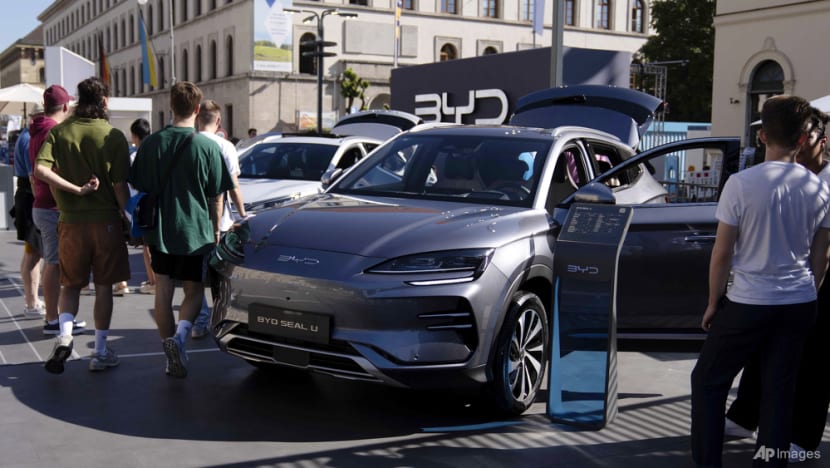EU, China continue negotiations over proposed higher EV tariffs ahead of upcoming vote
European Union member states are expected to vote this week on whether to impose further tariffs of up to 36.3 per cent on electric vehicles made in China.

File - Visitors watch a BYD Seal U car at the IAA motor show in Munich, Germany, Friday, Sept. 8, 2023. (AP Photo/Matthias Schrader, File)

This audio is generated by an AI tool.
BRUSSELS: The European Union and China have agreed to continue negotiations over the bloc’s proposal to impose further tariffs of up to 36.3 per cent on imported Chinese electric vehicles, amid souring relations between both sides.
EU member states are expected to vote on the proposed measures in the coming days. Bloomberg reported on Saturday (Sep 28) that the vote will take place on Oct 4, though this could change.
According to the report, the vote was slightly delayed due to last-minute negotiations with Beijing to try to find a resolution that would avoid the new levies.
The EU already has a standard 10 per cent duty on car imports. In June, the European Commission - the bloc’s primary executive arm - announced further provisional tariffs on Chinese EVs.
This stemmed from an EU probe into alleged unfair state subsidies given to China’s car manufacturing industry that were believed to pose an economic threat to European rivals. The proposed additional tariffs were also a bid by the bloc to tackle Chinese industrial overcapacity flooding the EU.
Specific duties were set for Chinese EV makers. These currently stand at 17 per cent for market leader BYD, 36.3 per cent for state-backed SAIC Motors, and 19.3 per cent for Geely.
The EU said the level of tariffs depended on the level of state subsidies received by the firms.
DAIRY PRODUCTS PROBE
When the EU first unveiled the new tariffs, Beijing called them a “naked protectionist act”.
In August, China launched an anti-subsidy probe into certain European dairy products targeting subsidies in the production of certain cheeses, milk, and cream.
The European Commission has challenged the investigation, calling for consultations with the World Trade Organization (WTO).
The Commission’s spokesperson for trade and agriculture Olof Gill said it was “of the firm view” that China’s probe was not in line with WTO rules.
“We are therefore taking action to protect our industry and protect our common agricultural policy and to signal our disagreement with China’s WTO incompatible action,” he added.
DAIRY SECTOR BEING HELD HOSTAGE: INDUSTRY LEADERS
Industry leaders said the sector is being held hostage, with the European Dairy Association’s secretary-general calling on the Commission to prevent the industry becoming collateral damage in a wider dispute with Beijing.
The EU exported almost US$2 billion in dairy products to China last year.
“China does this more and more often, threatening with measures against the meat industry, the pork industry in particular, because they know a few countries are going to have big problems when they follow through with it,” said Caroline van der Plas, party leader of the Farmer Citizen Movement - a Dutch agrarian and right-wing populist political party.
These countries include the Netherlands, Denmark and Spain. They are the EU’s top exporters of pork and consider China to be a big market.
Signs have emerged of China's retaliatory actions dividing the bloc, with member countries split on their support for the EV tariffs.
Top EU and Chinese trade officials have agreed to intensify efforts to find a resolution to these trade disputes.
In the meantime, those across a number of impacted sectors hope that officials will take time to chew over the potential stakes of a permanent confrontation between the two powers.
The proposed final duties will be implemented by the end of October unless a qualified majority of 15 EU members representing 65 per cent of the EU population votes against the levies.
















